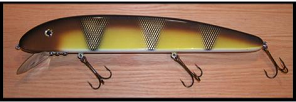|
|

Posts: 479
Location: Eden Prairie & Pine Island | I'm interested in dipping lures in a primer/sealer in order to get good coverage and save time. However, the sealer is two parts and not cheap, so whatever I don't use then goes bad and there tends to be a lot of waste when you dip/submerge lures in it since its got to be deep. Anyone come up with some solutions or ideas to prevent all the waste? I was thinking of getting/builidng a tube or narrow cylinder/can with a lid to dip lures into and then save the remaining sealer, but I was not sure how long it would last after you've mixed the two parts together. Wondering if refigerating it would help? Ideas appreciated.
G |
|
| |
|

Posts: 786
Location: Minnesota | GMan,
For my epoxy coats I use a large cookie pan. Flip flip and brush off excess, hang to dry and done! And then of course more clear coats once dry..... Works great for that and I would think it woudl work well for sealing too. I like the cookie pan because when the epoxy dries it peels right off the teflon. Sealer could just pour off and wipe clean. |
|
| |
|

Posts: 479
Location: Eden Prairie & Pine Island | Thanks for the suggestions. I guess what I'm really focusing on is how to prevent waste when dipping. Maybe your cookie sheet method though would help reduce it, too. |
|
| |
|

Posts: 364
Location: Kentucky | I don't have as much experience with this as you guys, but I tried using a tube (small plastic popcorn container). It worked fine for my 10 baits or so, but I still had plenty leftover and ended up with too much waste.
I like the cookie sheet plan! |
|
| |
|

Posts: 786
Location: Minnesota | Ya, with epoxy you have waste as it sets up. I calcualted how much epoxy is needed to coat each Grunt. I then ad 5% and it works out great. I have done up to 30 lures in a batch and only had a few oz. of waste. The good thing aobut your sealer is you can put it back... I spray mine but, they I am getting waste due to over spray but I consider the time I save... |
|
| |
|
Posts: 6
Location: Grove City, PA 16127 | Try useing welding rod cans. They come with a plastic lid and if they are taller than your lures you can cut them shorter so you don't use ase much sealer. Worked for me.
Musky Bound |
|
| |
|
| Has anyone tried putting epoxy on using a slow spinning motor?
I have motor I use to slow turn rods when I build them. I was thinking of fabricating a chuck to hold the eye and put the epoxy on while spinning and leave it spinning overnight so I don't get any drippage.
I haven't tried it yet... but the theory sounds good??? |
|
| |
|

Posts: 479
Location: Eden Prairie & Pine Island | Buzzard,
I think most of us lure builders either use that method or have dabbled with it. Some lure spinning racks are large (50 lures at a time), while others are small based on a BBQ rotisserie motor turning only 2 lures at a time. If you search this forum for "lure drying racks" you should get lots of information and some pictures. Drop me a line too if you like, as that is the method I use for topcoats. |
|
| |
|
| I had a grill motor lure-turner that I had a metal rod connected to that had 6 needle-nose Vise grips welded to. The other end on the metal bar rested in a hole that I drilled in a 2 x 10 that had a wooden square base. It worked great for six lures, but after I put the lures on after letting them hang and drip for a while, I still had to babysit them and check them every half hour or so to watch for bubbles that developed or other issues....had a fly land on one once, and a centipede another time.... Then the next morning, they were ready to go, but I learned early that you must use extreme caution when taking the lures off of what ever is holding them because sometimes the epoxy would attach itself to the Visegrip tip.
I've done some lures for myself and have had no problem by just pouring a coat of E-Tex over it and let it hang for 48 hrs. Then I would drill out the screw eyes and let it hang for 24 more and then wet sand it lightly as soon as it wasn't tacky and I would pour another coat on it from the opposite direction after it was cleaned and dried and let it hang for 48 more. After 2 coats, the E-Tex was as thick as the 3-D eyes that I use. Some lures got a 3rd coat, especially during the summer when temps are high and the E-Tex viscosity is much thinner.
Drying racks are cool, and I have seen some amazing varieties, but for lures like surface lures and twitch baits where you don't want a real thick coat, hanging the lures can be a viable option. Considering some lures come with one coat of a spray-on top coat, I think that some of the real thick top coats might be over kill. I know that we all want to protect our lures and keep them waterproof, but I've seen 3 footers go through clearcoat that was an eigth of an inck thick.
Hooks, teeth and the combination of the two, makes it hard to protect your lures from damage. Making sure to take care of any trouble spots after fishing, with fingernail polish or Devcon 2-part epoxy, can save lures from any further damage. I always carry some in my boat, and think every knowlegable muskie angler should add a fix-it kit to his boat. |
|
| |
 Dipping Lures in Sealers
Dipping Lures in Sealers Dipping Lures in Sealers
Dipping Lures in Sealers